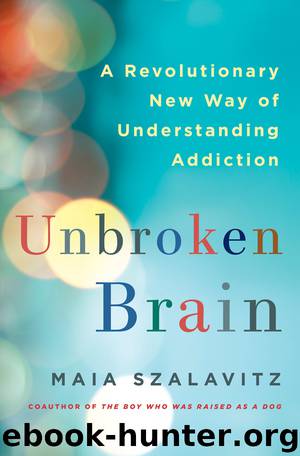Unbroken Brain by Maia Szalavitz

Author:Maia Szalavitz
Language: eng
Format: epub
ISBN: 9781466859562
Publisher: St. Martin's Press
FIFTEEN
Antisocial Behavior
How can you tell when an addict is lying? His lips are moving.
—ANONYMOUS
I HAD GONE TO SEE MY counselor, Irene, with some misgivings. I already had the sense that she disliked me, because during group therapy sessions she would dismiss nearly everything I said as “intellectualizing” or “manipulating”—regardless, it seemed to me, of what I was attempting to express or of how deferential to her I tried to be. Still, I wanted to do everything I could to get better, so as I’d been directed, I was now sitting in her cramped office because I felt shaky and wanted extra support.
It was late August 1988, and I was at a 28-day inpatient rehab program called ARC Westchester (now closed). I’d been referred there after completing the seven-day hospital detox I’d entered nearly two years after my arrest. While the judge hadn’t mandated further treatment, I knew that following the recommendations of treatment professionals that I get additional help could only aid my case. I was trying my best to do that. Since we were supposed to “open up” about what troubled us, I told Irene that I felt insecure about my looks and was worried that no man would ever love me.
“How can you even expect them to look at you?” she retorted, exclaiming, “You look like Jiminy Cricket.” For a moment, I thought I’d misheard her, even though she articulated the words clearly. I am sure I wasn’t able to disguise my look of utter incomprehension. I’d previously been unable to vocalize my fears, let alone share them with a therapist. I’d now tried to seek help when I felt low, attempting to follow the rehab’s recommendations precisely. This bizarre statement was my reward. I didn’t know how to react or even what to think. I started to worry that I would actually get in trouble for trying to do what I’d been told was the right thing.
The rehab I attended was actually among the best of its time. It was based on the 12-step-focused “Minnesota Model” originated at Hazelden and still widely used. However, what I experienced in treatment further illustrates the paradoxes of American addiction care, which moralizes while claiming to be medicine. As noted earlier, the overwhelming majority of American addiction treatment still uses the Minnesota Model. To improve rehab, a new perspective is needed.
Although the Minnesota Model emphasizes that addiction is a brain disease, what it really does at its best is teach ways to manage the aberrant learning at the heart of the problem. Unfortunately, by taking a one-size-fits-all approach and assuming that all people with addictions have the “defects of character” that the 12-step programs associate with “the disease,” this model tends to undercut itself and undermine its ability to teach. By presuming that all addicts have antisocial personalities, the Minnesota Model can also bolster and promote ineffective ways of teaching and counseling.
My experience illustrates many of the issues here—and, sadly, it is still quite representative of what many people undergo in addiction treatment in the United States.
Download
This site does not store any files on its server. We only index and link to content provided by other sites. Please contact the content providers to delete copyright contents if any and email us, we'll remove relevant links or contents immediately.
The Hacking of the American Mind by Robert H. Lustig(4361)
Right Here, Right Now by Georgia Beers(4194)
Fingerprints of the Gods by Graham Hancock(3982)
Goodbye Paradise(3795)
Bad Pharma by Ben Goldacre(3415)
Happiness by Matthieu Ricard(3037)
More Language of Letting Go: 366 New Daily Meditations by Melody Beattie(3017)
The Social Psychology of Inequality by Unknown(3011)
The Plant Paradox by Dr. Steven R. Gundry M.D(2599)
Drugs Unlimited by Mike Power(2584)
Confessions of a Shopaholic by Sophie Kinsella(2337)
Borders by unknow(2300)
Make Love Not Porn by Cindy Gallop(2097)
Dry by Augusten Burroughs(2090)
Stop Being Mean to Yourself: A Story About Finding the True Meaning of Self-Love by Melody Beattie(1982)
Getting Off by Erica Garza(1926)
Belonging by Unknown(1849)
Yoga and the Twelve-Step Path by Kyczy Hawk(1831)
Unmasking Male Depression by Archibald D. Hart(1797)
